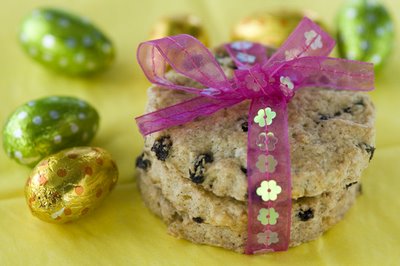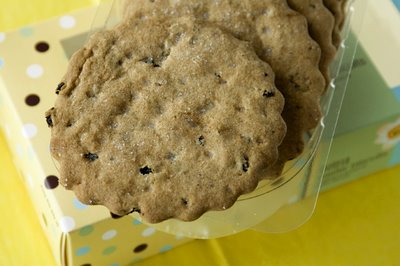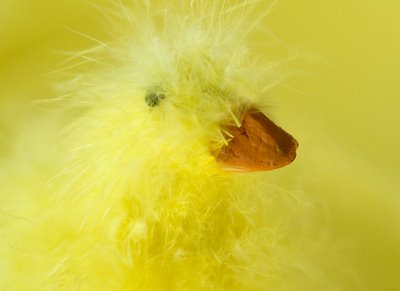
Easter biscuits are made across Britain and are so ubiquitous that Marks & Spencer sell them as part of their seasonal fare (see below). Traditionally they are served after church on Easter Sunday, and are presented in a bundle of three biscuits to represent the Holy Trinity. They are eaten alongside hot cross buns, simnel cake and copious quantities of chocolate eggs as part of our Easter festivities. The feasting comes at the end of Lent, so the taste of rich foods is supposed to come as a treat. Similar biscuits eaten before Lent commences are known as Lenten biscuits, and are made to use up eggs, sugar etc. in the way that the Shrove Tuesday pancake does.
The West Country (from Gloucestershire, Avon, Wiltshire and Dorset westwards) has an association with Easter biscuit recipes, but my reading turned up more country-wide variations than there are days in Lent, so I think that this is one of those recipes with a central 'theme', but for which there are unlimited variations. The theme is spice and fruit. All Easter biscuits are spiced, either through a small addition of mixed spice or ground cinnamon. The fruit is either solely currants, or can be currants with a little mixed peel. Some recipes use grated lemon zest for extra zing. Biscuits made commercially may have oil of cassia added. Cassia is a part of the same (laurel) family as the cinnamon that you can pick up in the supermarket. It has a similar but stronger and more bitter flavour. An Bristol educated, Australian resident writes of making Easter biscuits at catering college in Bristol, that had oil of cassia as a flavouring. A quick scout around the net reveals it to be an ingredient you can pick up through retailers that stock essential oils etc. (should you wish to try it). I also found one commercial bakery that uses it as a flavouring, and proclaims the fact.
My recipe is from 'Good Things in England', edited by Florence White. This book first published in 1932 was in Florence's words, '...an attempt to capture the charm of England's cookery before it is completely crushed out of existence.' The book documents in recipe form traditional and regional dishes from all corners of the country. A similar study was made of Scottish food by F. Marian NcNeill in 1929 (I have yet to learn of a similar text covering Welsh food).
The post-war years encouraged a certain amount of introspection and a re-evaluation of English culture, but were also a forward looking age, and a generation that saw foreign culture as something to be experimented with and explored. Florence White did not seek to exclude the modern, but wished to record the riches of England's larder, and to talk with the people who were still preparing dishes with ancient credentials, and to ensure that such recipes were documented for future generations (such as ours - Florence, this posting is for you). The flypiece to the book reads, 'A Practical Cookery Book for Everyday Use. Containing Traditional and Regional Recipes suited to Modern Tastes contributed by English Men and Women between 1399 and 1932.'
Florence White set up the English Folk Association in 1931, and in the January of that year was held the first English Folk Cookery Exhibition in Kensington, London. My recipe for Easter biscuits was supplied for this exhibition by Mrs. Wyatt of Huish Episcopi, Somerset. Sedgemoor is a coastal region of Somerset, firmly in the 'West Country'.
Sedgemoor Easter Cakes (yep, biscuits can also be cakes)
225g plain flour
110g butter
110g caster sugar
110g currants
1/2 tsp mixed spice
1/2 tsp ground cinnamon
1 egg
2 tbsp brandy
1. Preheat oven to 180C/350F/Gas 4. Prepare two baking sheets.
2. Rub the butter into the flour.
3. Add the sugar, currants, spice and the cinnamon.
4. Beat the egg and mix with the brandy - add to the dry ingredients ands stir until well incorporated.
5. Roll out about 1/2 inch/1cm thick, and cut into rounds.
6. Bake for about 20 minutes until golden brown.
There was no instruction to glaze with egg white and sprinkle with sugar, which most other recipes suggested. I thought that by doing so the finished biscuits might have looked a bit more appetising. They tasted rather fine, but the surface of them was very matt and had large dimples. However, on a closer examination of Marks & Spencer's efforts, I saw that their biscuits were identical in colour, also had large dimples, and although were speckled with sugar grains were equally matt. A taste test (tough job, but someone needs to address these things) revealed a bisuit with a drier consistency than mine, and more snap. The main flavour to my taste buds appeared to be aniseed with a hint of caramel. All in all they were no better, no worse, simply different (oh, alright then. My biscuits beat M&S's by a Easter bunny's whisker, but don't tell them).

Marks & Spencer's Easter Biscuits - flavoured with mixed spice (cinnamon, coriander, ginger, aniseed, dill, cloves, nutmeg), and a dash of lemon juice).

Easter chick. Who are you calling ugly?
Those biscuits look delicious and the pictures are really good!
ReplyDeleteI love your blog and I have added it to my list of links...
Being of English nationality (although I never lived in England), it is a pleasure to find the recipes I know and bake regularly...
Hi Anne,
ReplyDeleteanother great post...I love the bits of trivia and history, it really adds a nice touch. I'm preparing easter brunch next week and will definetly make some of these...happy easter
Eva
Oh! We had these biscuits after church on Easter morning (in Australia)! The woman who made them said they were an English recipe, but I had no idea they were a tradition! Very yummy - a little like crispy hot cross buns.
ReplyDeleteI wonder if the Cassia is a Bristol thing. My mother was taught to make the biscuits by her mother and she was told that the "must" ingredient was cassia. As mum is 83 this would take things back to at least the date of your cookery book. Nan was a sempstress and did not I think have any connection to commercial baking
ReplyDeleteThanks for the information Jane. I wonder if anyone else knows whether the cassia was a flavour particular to Bristol? Perhaps the spice was available locally because of the port/or perhaps a industry used it on a large-scale and locals developed a taste for it?
ReplyDeleteI was born in 1925 in Bishopsworth which at the time was a village just outside Bristol(became part of the city in about 1938). My Grandmother, who died in 1939 at the age of 78, my mother and her sisters always put Oil of cassia in their Easter B. When I married in 1949 my mother gave me a tiny bottle of it and when after a number of years it was finished I could not find a chemist who knew it. I finally found some in Culpeppers in Bath in the 80's. It was marked"Not to be taken internally".However as my family had survived though using it I continued to use it but Culpeppers no longer keep it. I now live in Ireland and this week received some from a place in Ireland which lists an A to Z on herbal oils. The bottle still has a warning saying thet it is not to be taken internally nor to be used on the skin. The only person I know who also used it in her biscuits is another Bristolian.
ReplyDeleteThanks for the extra insight, Anon.! I think I shall have to track down some cassia oil and bake a sample batch of Easter biscuits using it. Does anyone know why the oil is now marked not for internal consumption/use on skin?
ReplyDeleteI come from Bristol but have lived in New Zealand for 54 years!
ReplyDeleteWhen I wanted to get the right flavour for Easter biscuits my mother asked Caroline's cake shop in Westbury on Trym and they told her it was oil of cassia. I was able to get some from the pharmacist but unfortunayely it is not now available though I don't know why.
Thank you for the information and I must try and get some for next year. Happy Easter!!
Anne
If anyone still wants oil of cassia, my husband just got some today, he had to order it from a specialist food supplier. The bottle he brought home has an address and phone number on it as follows: Topfit health Products
ReplyDelete28 Dial Hill road
Cleavedon
BS21 7HL (England)
Tel 01275 340042
Happy baking
Tracey & Don
Thanks for the information Tracey. Interestingly, the company that your oil comes from is based just west of Bristol - it has a Bristol postcode - so it still is produced in the locality.
ReplyDeleteI now live in Bristol but by birth I'm a cockney and my Mum and Grandma are Londoners and we use cassia oil
ReplyDeleteI too am a bristol native and have always used cassia oil in my easter biscuits! my mum does too and she was also born and bred in the bristol area!!
ReplyDeletehow strange!!
These are simply the best biscuits or cakes I have ever eaten. Great Easter tradition and I may even eat a couple during the Royal Wedding.
ReplyDeleteMmmmmmm, these Sedgemoor Cakes look delicious. I just got back from a buy silver fair near chipping campden in the cotswolds, these cakes would have gine down nicely with a cup of darjeeling tea.
ReplyDeletevery interesting blog! check this site's out it might help you a lot.
ReplyDeletekeyword research, choosing the right keywords,
affiliate marketing keywords
another great post...I love the bits of trivia and history, it really adds a nice touch. I'm preparing easter brunch next week and will definetly make some of these...happy easter
ReplyDeleteearly in the morning come across your blog..... so with watered mouth i wanna look to eat something.
ReplyDeleteI love the bits of trivia and history, it really adds a nice touch. I'm preparing easter brunch next week and will definetly make some of these...happy easter
ReplyDeleteWe had these biscuits after church on Easter morning (in Australia)! The woman who made them said they were an English recipe, but I had no idea they were a tradition!
ReplyDeleteI love your blog and I have added it to my list of links...
ReplyDeleteBeing of English nationality (although I never lived in England), it is a pleasure to find the recipes I know and bake regularly...
driopping on youe best blogdh
ReplyDeleteThose biscuits look delicious and the pictures are really good!
ReplyDeleteI love your blog and I have added it to my list of links...
i was failed download the files,..can you show me the mirror Tempe Penyet - Mbak Desi
ReplyDeleteOh! We had these biscuits after church on Easter morning (in Australia)! The woman who made them said they were an English recipe, but I had no idea they were a tradition! Very yummy - a little like crispy hot cross buns.
ReplyDeletewow, very nice. love the photo's too
ReplyDeleteMedisoft software for all your medical software needs.
ReplyDeleteVery helpful information, readers will truly love to read your article.check out
physician medical billing services
for all your medical billing needs.
I'm from north somerset. It is impossible to get the authentic taste without oil of cassia, just a couple of drops. Now living in west Wales I had a bit of a hunt to find some, to take to my daughter in Louisiana.
ReplyDeleteJust came across your post. I was searching for an Easter Biscuit recipe that I can cook in a convection microwave because my oven has died on me and no hope of getting a new one before Easter now.
ReplyDeleteI actually live in Huish Episcopi! Although I have lived in the area nearly all my life, I've never heard of Sedgemoor Cakes but I'll definitely try cooking these. They sound delicious
We have always had "Sedgemoor Easter Cakes" in our family - sixty years to my own knowledge. Can't find where our recipe originated from but it is very similar - but replaces brandy with rum (we have always done that in Christmas recipes too) and our spice has always been caraway seed. We bake them in patty tins - and I now much prefer using mini muffin tins to make bite-size balls of a very special little cake....
ReplyDelete